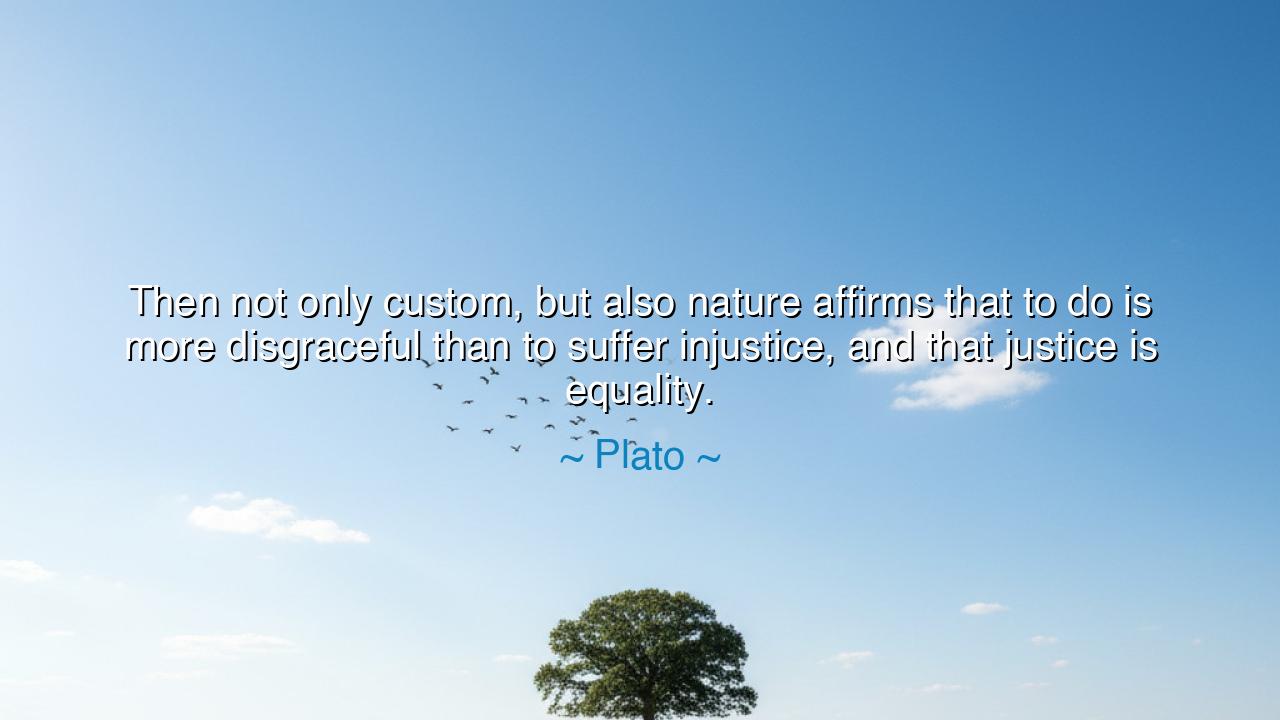
Then not only custom, but also nature affirms that to do is more
Then not only custom, but also nature affirms that to do is more disgraceful than to suffer injustice, and that justice is equality.






In the immortal words of Plato, the philosopher of philosophers, we hear a truth that pierces the ages: “Then not only custom, but also nature affirms that to do is more disgraceful than to suffer injustice, and that justice is equality.” These words are not the utterance of a mere thinker—they are the voice of the eternal moral law, the voice that speaks not only to the mind but to the soul. In them, Plato declares that to commit evil is a deeper corruption than to endure it, and that the heart of all justice lies in equality, the balance between souls. It is a teaching that challenges the pride of power and the vanity of victory, reminding mankind that the noblest strength is not domination, but virtue.
To understand the meaning of this quote, one must first return to Plato’s vision of justice as the harmony of the universe and of the soul. In his Republic, Plato taught that the just man is like a well-ordered city, in which reason rules, courage defends, and desire obeys. When each part keeps its rightful place, there is peace; when one part overreaches, chaos ensues. Thus, to do injustice—to harm another, to lie, to steal, or to oppress—is not only an injury to the victim but a disordering of the soul itself. To suffer injustice, by contrast, wounds the body and fortune, but leaves the spirit untouched. In this way, Plato reveals a paradox both profound and liberating: it is better to be wronged than to do wrong, for evil done festers in the heart of the doer, while the sufferer retains his moral dignity.
The second truth in Plato’s saying—that justice is equality—flows naturally from the first. For what is equality, if not the recognition that all souls share the same divine essence? Injustice arises whenever one soul claims to be more than another—when kings treat subjects as slaves, when the rich ignore the poor, or when nations trample the weak. Yet in the eyes of nature—and by this, Plato means the divine order of being—all stand upon the same sacred ground. Just as the stars are different in brightness but equal in belonging to the heavens, so too are human beings varied in strength but equal in worth. To act justly, then, is to live in accordance with this natural balance, to walk in harmony with the eternal rhythm that governs the cosmos itself.
History, too, has offered living proof of this truth. Consider the life of Socrates, Plato’s own teacher and the moral father of philosophy. When falsely accused and condemned to death, Socrates could have fled Athens or begged for mercy. Yet he chose instead to drink the cup of hemlock, declaring that it was better to die innocent than to live guilty. He suffered injustice, but did not commit it. In his death, he embodied the very principle that Plato would later proclaim: that to do wrong is more disgraceful than to endure it. His accusers gained nothing but shame; Socrates, though slain, gained immortality. Thus, through his example, we see how moral integrity transcends the fleeting judgments of men and aligns itself with the eternal order of the divine.
Yet Plato’s wisdom extends beyond the philosopher’s circle—it reaches into every corner of human life. In the household, the marketplace, and the realm of nations, this truth endures: when one takes advantage of another, the harm spreads not only outward but inward, corrupting the heart that inflicts it. The tyrant, though seated upon a throne, is a prisoner of his own guilt; the oppressor, though rich, is poor in spirit. But the one who endures with patience, who refuses to answer injustice with injustice, stands closer to the gods than to men. In this, Plato echoes the moral vision that would later shape the teachings of sages across the world—from the Buddha, who taught compassion for all beings, to Christ, who blessed the meek and the persecuted.
The lesson that we, the heirs of this wisdom, must learn is both simple and profound: do not envy the powerful who do wrong, nor despair when you are wronged. To live justly, to act in fairness, and to treat others as equals in the eyes of truth—this is the path of the noble soul. Injustice may wound the body, but it cannot stain the conscience unless we permit it. To commit injustice, however, is to destroy one’s inner peace and lose one’s share in the harmony of the universe. The truly wise seek not to triumph over others, but to triumph over themselves.
Therefore, remember this as you walk the path of life: justice is not a law written by men, but a song sung by nature itself. It is the rhythm that binds heaven and earth, the order that gives meaning to existence. To live justly is to live in tune with that sacred melody. So do no harm, even when wronged; honor the equality of all beings, even when power tempts you to rise above them. For as Plato teaches, to do injustice is to dishonor the divine within you, and to live justly is to reflect the light of eternity itself. In this, and only in this, lies true honor and lasting peace.






AAdministratorAdministrator
Welcome, honored guests. Please leave a comment, we will respond soon